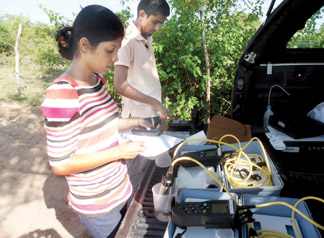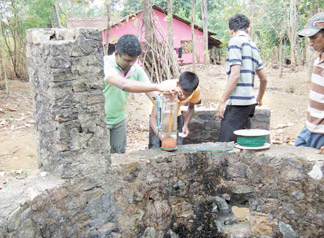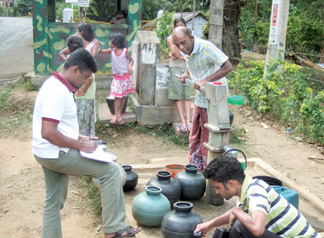|
Detecting defects of groundwater:
Atomic Energy Authority ready with indigenous expertise
By Dhaneshi Yatawara
An array of problems are rising in several parts of the country on
the condition of the ground water reserves. Over extraction of
groundwater through tube wells set up irregularly in several parts of
the country has lead to water drying up.
 |
| Checking with
isotope hydrology meter |
 |
| Collecting
data from wells |
 |
| From tube
wells |
Groundwater is recharged from, and eventually flows to, the surface
naturally; natural discharge often occurs at springs and seeps, and can
form oases or wetlands. Groundwater is also often withdrawn for
agricultural, municipal and industrial use by constructing and operating
extraction wells.
Groundwater is an important part of the water cycle. Groundwater is
the part of precipitation that seeps down through the soil until it
reaches rock material that is saturated with water. Water in the ground
is stored in the spaces between rock particles. Groundwater slowly moves
underground, generally at a downward angle and may eventually seep into
streams, lakes, and oceans.
Groundwater makes up about twenty percent of the world's fresh water
supply, which is about 0.61 percent of the entire world's water,
including oceans and permanent ice. Global groundwater storage is
roughly equal to the total amount of freshwater stored in the snow and
ice pack, including the north and south poles. This makes it an
important resource which can act as a natural storage that can buffer
against shortages of surface water, as in during times of drought.
Groundwater can be a long-term 'reservoir' of the natural water cycle,
as opposed to short-term water reservoirs like the atmosphere and fresh
surface water.
With research done over period of time it has come to the knowledge
of the scientists that ground water of the country needs to be evaluated
soon for the benefit of the people. This could lead to unsolved problems
in human health issues like the Chronic Kidney disease that continue to
make farmers of the North Central Province suffer.
Addressing all these issues the Atomic Energy Authority has come
forward with a state of the art technology to study the ground water
quality and movements with the use of a separate science called 'isotope
hydrology'. "We are in fact developing the isotope hydrology laboratory
at the Atomic Energy Authority ready to be a service provider," said
Atomic Energy Authority Chairman Dr. Ranjith Wijewardane.
"We knew that for a long time that there are so many applications
using isotope hydrology. This is one of the peaceful nuclear
applications. In Sri Lanka there are many fields that need the
assistance of isotope hydrology which in most cases we seek expertise
from foreign professionals spending huge amounts of funds," said Dr.
Wijewardane.
According to Dr. Wijewardane, the Atomic Energy Authority started
developing isotope hydrology laboratory around 2005.
As the AEA's Senior Scientific Officer Viraj Edirisinghe said this
isotope hydrology will give the opportunity to study specially the
recharge process of ground water - where the ground water originating
from - we can trace that path. Along with Viraj Edirisinghe three other
scientists are involved in the experiment.
"In order to get the details of the groundwater we need data of rain
water from different locations of the country. The reason is the
composition of oxygen isotope in rain water is different from place to
place. Water under ground should have the same percentage if the source
is solely rain water," he said.
These isotopes work as the fingerprint of the ground water by
examining a sample of water we can identify where the water is taken
from.
"If the groundwater has different mixture of isotopes than the rain
water of the immediate area we can identify the other sources of water
by testing large water bodies in the close proximity," he said.
If the water is polluted Isotope hydrology can find the source of
contamination as well. Using this technology we can protect the ground
water resources.
"Knowledge gathered by the isotope testing is very important for
policy makers in water sector departments. How much water can be
extracted from particular areas can be decided by recharging source and
recharging areas," Edirisinghe said.
"Normally the ground water is recharged regularly - meaning it
continuously gets water from its source. But there are other groundwater
reserves where there is no recharging source and water is very old," he
said.
Accordingly extracting water from such reserves can lead to drying up
of water reserve eventually effecting the the soil moisture.
"At present we are collecting data in certain parts of the North
Central Province. Our concern for the dry zone is because most of the
water related problems are in the dry zone. Concerned people of these
areas are assisting us to collect rain water in order for us to test and
get information," he said.
With the existing data the scientists who are conducting the testing
have already started to find connections between certain water tanks and
ground water reserves that supply water through tube well to several
villages. "we have collected data of water from tube wells within 3 - 4
kilometre radius of Kandalama and Kalawewa tanks that showed the tube
well water had isotopes found in the tanks.
Though the main recharge source of groundwater is rain tanks and such
large water reserves can act as recharge sources as well.
"This is only once case of the there other areas we are slowly
starting to study groundwater - areas like Jaffna peninsula and Puttlam
area. In these two areas studies are done in collaboration with the
water resources board," said Edirisinghe explaining their overall study
area.
As they further said this is only one form of usage in isotopes.
"Another main area this technology can be used is detecting leakages in
dams. The Atomic Energy Authority has successfully found the leakage
point of the Samanala wewa tank after several attempts by foreign
scientists spending millions of money," he said.
What happens when there is a leakage in a dam is that it cannot be
filled up to the maximum level. Thus effecting the electricity power
generation using the water flow. "The most important and difficult issue
is locating the leakage.
When it is identified the relevant authorities can take proper action
to rectify the matter avoiding the low electricity power generation and
possible risks," he said.
In order to create a network among the relevant authorities, the AEA
is planning to have interactive sessions with them, thus saving millions
of rupees that is unnecessarily spent on areas that needs the technology
of isotope hydrology.
*************
Isotopes
Isotopes are forms of the same element that have variable numbers of
neutrons in their nuclei. Isotope hydrology is a field of hydrology
(study of water) that uses isotopic dating to estimate the age and
origins of water and of movement within the hydrologic cycle. Water
molecules carry unique fingerprints, based in part on differing
proportions of the oxygen and hydrogen isotopes that constitute all
water. The isotope hydrology program at the International Atomic Energy
Agency works to aid developing states and to create a detailed portrait
of Earth’s water resources. An arsenic pollution crisis in Bangladesh
that the World Health Organisation calls the “largest mass poisoning of
a population in history” has been investigated using this technique.
************* |


